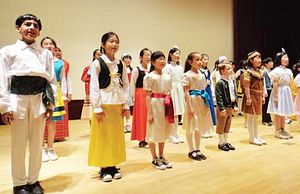The Joongang Ilbo recently published an article on soldiers in the Army who come from multicultural (Kosian) families – that is, a family where one parent is not ethnic Korean. It cites an increase in the number of multiethnic Koreans serving in the military.
According to the article, the number of “mixed-race men” in the military stood at 306 in 2013, and 185 more joined in 2014; only 52 joined in 2010. The article portrays the changes positively. One solider is quoted as wanting to be “useful to my homeland.” Another is quoted as saying, “After going through all the experiences that a Korean man must, I feel like I am a true Korean.” The state is portrayed as welcoming the incorporation of multiethnic soldiers into the military’s ranks. “Soldiers from multicultural families are also citizens of this country,” says the Ministry of National Defense.
It is one thing for the state, viz. the military, to embrace ethnic diversity. Organizations like the military need conscripts. And while it is significant that a conservative organization like the military recognizes the changing social realities in Korea, it isn’t just the military that must deal with the challenges of Korea’s changing ethnic and cultural composition. It is a society-wide phenomenon. Indeed, under the heading of “multiculturalism,” South Korea’s broader demographic changes have received a fair amount of attention as of late. Those studying or interested in South Korean society should take heed. There is much to learn.
At CFR’s Asia Unbound, Darcie Draudt provides a short recap of the broader demographic shift and the social and policy responses. She notes up front, “South Korea, a country that is virtually homogenous ethnically, faces a demographic challenge: how to incorporate the 1.57 million foreign-born residents… into its social, economic, and political landscape. The number of foreign-born residents in 2013 amounted to 1.76 million, a 8.4 percent increase from the year prior, after adding undocumented foreigners.” Draudt argues that public discourse on the issue and the initial policy response (five year plans implemented by the Ministry of Justice) is part of a larger legal and public debate on the question “What makes one Korean?”
The debate over national identity has largely revolved around two strands of nationalism: ethnic nationalism, where one is defined as Korean by “blood;” and civic nationalism, where one is defined as Korean by “acting Korean” (i.e., speaking Korean, following Korean laws, respecting Korean traditions, etc.).
Draudt maintains that if Korea is to mature and prosper socially, it must embrace civic nationalism and be open to outside assistance from organizations like the U.N. and other multiethnic countries “to develop institutions and themes to better shape a more accepting form of what it means to be Korean, however complicated that may be.”
Recent public opinion research gives people like Draudt reason for optimism. Dr. Kim Jiyoon, director of the Public Opinion Studies Center at the Asan Institute for Policy Studies, finds that young South Koreans (those in their 20s) are increasingly likely to see civic components as delineating the preconditions for “Koreaness.”
Clearly, things are changing. But how much?
Since Draudt published her article, the U.N. has publicly called on Korea to adopt “a comprehensive anti-discrimination law… to address the issue of racism and xenophobia in view of the country’s history of ethnic and cultural homogeneity.” Special Rapporteur on racism, Mutuma Ruteere, finds that despite the adoption of multicultural policies at the institutional level, “at the individual level, there have been isolated incidents of private acts of racism, racial discrimination and xenophobia.”
Perhaps this is simply a case of elites “talking the talk” but society not “walking the walk?”
Indeed, there is cause for skepticism regarding the discourse on Korea’s multicultural policies and Korea’s multicultural society. It is incontrovertible that South Korea is undergoing a demographic shift; however, let us not confuse elite or state discourse – i.e., South Korea is more ethnically diverse, therefore we are accepting and adjusting to this fact — with the social realities for those of a “mixed-raced” background. Consider this: If resettled North Korean defectors, who are of the same ethnic origin/”blood,” face high barriers to social success and integration, how might foreign workers from other East Asian nations fare?
While it is popular to speak positively of the demographic shifts and Korea’s multicultural policies, we should not let our critical guard down. In fact, as I’ve argued elsewhere, the policies pursued in South Korea aren’t really multicultural policies at all but rather assimilation policies. And if assimilation is the end goal, then Korea has a long way to go. Despite the dwindling away of ethnic-based understandings of what makes one Korean (prevalent among South Korean youth), most of society still sees “blood” as the sine qua non of Koreaness. Those following the ongoing demographic shifts and the accompanying policy changes ought not accept discourse change for actual change; how the state and Korean society adjust to places like Ansan (a highly diverse city in Gyeonggi Province), for example, will tell us a great deal about how a new, “multicultural” South Korea will look.






























